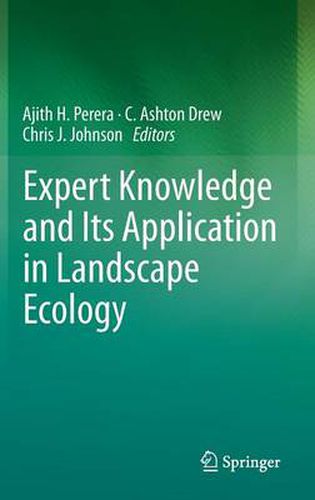Readings Newsletter
Become a Readings Member to make your shopping experience even easier.
Sign in or sign up for free!
You’re not far away from qualifying for FREE standard shipping within Australia
You’ve qualified for FREE standard shipping within Australia
The cart is loading…






This title is printed to order. This book may have been self-published. If so, we cannot guarantee the quality of the content. In the main most books will have gone through the editing process however some may not. We therefore suggest that you be aware of this before ordering this book. If in doubt check either the author or publisher’s details as we are unable to accept any returns unless they are faulty. Please contact us if you have any questions.
Typically, landscape ecologists use empirical observations to conduct research and devise solutions for applied problems in conservation and management. In some instances, they rely on advice and input of experienced professionals in both developing and applying knowledge. Given the wealth of expert knowledge and the risks of its informal and implicit applications in landscape ecology, it is necessary to formally recognize and characterize expert knowledge and bring rigor to methods for its applications. In this context, the broad goal of this book is to introduce the concept of expert knowledge and examine its role in landscape ecological applications. We plan to do so in three steps: First we introduce the topic to landscape ecologists, explore salient characteristics of experts and expert knowledge, and describe methods used in capturing and formalizing that knowledge. Second, we present examples of research in landscape ecology from a variety of ecosystems and geographic locations that formally incorporate expert knowledge. These case studies address a range of topics that will interest landscape ecologists and other resource management and conservation professionals including the specific roles of expert knowledge in developing, testing, parameterizing, and applying models; estimating the uncertainty in expert knowledge; developing methods of formalizing and incorporating expert knowledge; and using expert knowledge as competing models and a source of alternate hypotheses. Third, we synthesize the state of knowledge on this topic and critically examine the advantages and disadvantages of incorporating expert knowledge in landscape ecological applications. The disciplinary subject areas we address are broad and cover much of the scope of contemporary landscape ecology, including broad-scale forest management and conservation, quantifying forest disturbances and succession, conservation of habitats for a range of avian and mammal species, vulnerability and conservation of marine ecosystems, and the spread and impacts of invasive plants. This text incorporates the collective experience and knowledge of over 35 researchers in landscape ecology representing a diverse range of disciplinary subject areas and geographic locations. Through this text, we will catalyze further thought and investigations on expert knowledge among the target readership of researchers, practitioners, and graduate students in landscape ecology.
$9.00 standard shipping within Australia
FREE standard shipping within Australia for orders over $100.00
Express & International shipping calculated at checkout
This title is printed to order. This book may have been self-published. If so, we cannot guarantee the quality of the content. In the main most books will have gone through the editing process however some may not. We therefore suggest that you be aware of this before ordering this book. If in doubt check either the author or publisher’s details as we are unable to accept any returns unless they are faulty. Please contact us if you have any questions.
Typically, landscape ecologists use empirical observations to conduct research and devise solutions for applied problems in conservation and management. In some instances, they rely on advice and input of experienced professionals in both developing and applying knowledge. Given the wealth of expert knowledge and the risks of its informal and implicit applications in landscape ecology, it is necessary to formally recognize and characterize expert knowledge and bring rigor to methods for its applications. In this context, the broad goal of this book is to introduce the concept of expert knowledge and examine its role in landscape ecological applications. We plan to do so in three steps: First we introduce the topic to landscape ecologists, explore salient characteristics of experts and expert knowledge, and describe methods used in capturing and formalizing that knowledge. Second, we present examples of research in landscape ecology from a variety of ecosystems and geographic locations that formally incorporate expert knowledge. These case studies address a range of topics that will interest landscape ecologists and other resource management and conservation professionals including the specific roles of expert knowledge in developing, testing, parameterizing, and applying models; estimating the uncertainty in expert knowledge; developing methods of formalizing and incorporating expert knowledge; and using expert knowledge as competing models and a source of alternate hypotheses. Third, we synthesize the state of knowledge on this topic and critically examine the advantages and disadvantages of incorporating expert knowledge in landscape ecological applications. The disciplinary subject areas we address are broad and cover much of the scope of contemporary landscape ecology, including broad-scale forest management and conservation, quantifying forest disturbances and succession, conservation of habitats for a range of avian and mammal species, vulnerability and conservation of marine ecosystems, and the spread and impacts of invasive plants. This text incorporates the collective experience and knowledge of over 35 researchers in landscape ecology representing a diverse range of disciplinary subject areas and geographic locations. Through this text, we will catalyze further thought and investigations on expert knowledge among the target readership of researchers, practitioners, and graduate students in landscape ecology.